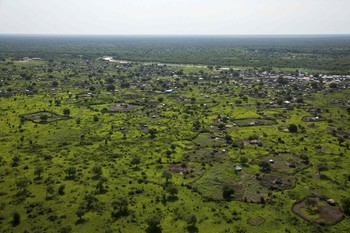NGOs, civilians told to leave Kapoeta and Pibor towns, amid safety fears
May 4, 2013 (JUBA) – Rebel forces from the South Sudan Democratic Movement/Army (SSDM/A) are seriously advising civilians and NGOs to leave the South Sudanese towns of Kapoeta and Pibor within a week, amid concerns for their safety.

The group has also threatened to mount more attacks in areas around the towns, located in Eastern Equatoria and Jonglei states respectively.
The SSDM/A was not among the thousands of rebel forces that surrendered their weapons in Unity state’s Mayom county on April, 26 after accepting an amnesty offer from president Salva Kiir.
According to reports by Reuters, some 3,000 rebel fighters from the South Sudan
Liberation Army (SSLA) crossed the border from Sudan with about 100 trucks and handed over their weapons to authorities in the oil-rich state, which lies on the border between the two countries.
“Our struggle against the regime in Juba is not over until all the conditions of the SSDA are met,” the spokesman for the SSDM/A, Col. Peter Konyi Kubrin, said in a statement on Thursday.
“In order to bring to an end to the suffering of our people, arrest the collapse of our nascent nation, and to rid it of the dictatorship gripping it now, a popular revolution must take place”, he added.
KEY DEMANDS
The SSDM/A’s 12 key demands include the dissolution of the current South Sudanese government, which it wants replaced by a transitional revolutionary government until general elections can be held and a permanent constitution enacted.
The group wants the SPLA transformed into a truly professional and inclusive national unit.
It has called for special priority to be given to the delivery of services and infrastructure, as well as radical economic reform in policies and institutions in order to ensure food security and fast-track industrialisation.
In addition, the SSDM/A says civil services should be restructured so that it is based solely on qualification and experience, with rapid legal and security reforms needed to ensure good governance in the country.
“The new government shall take swift action to resolve the tribal disputes by peaceful means [and] take legal means to prosecute all those involved in corruption and request the repatriation of the money embezzled from the countries where the accounts are kept”, the list of demands included.
Other demands related to the establishment of good relations with neighbouring African countries, as well as the international community for the mutual benefit and interest of the South Sudanese people.
The SSDM/A said it also stands ready to negotiate in good faith with the Sudanese government on outstanding issues between the two countries in the context of its sovereignty over its territories.
“We are not war mongers but are seeking a serious peaceful resolution to the armed conflict through dialogue and negotiations”, Kubrin added.
AMNESTY REJECTED
Kubrin said the amnesty offer was rejected on the basis that the rebel group still had “genuine grievances” against the South Sudanese government, which had yet to be addressed.
In an earlier statement issued last month, the SSDM/A questioned the credibility of Kiir’s offer, saying the announcement was made through the mass media without any direct consultation with the group’s leadership.
“If the Government of the Republic of South Sudan is serious about a negotiated peaceful settlement to the current conflict in the country, then as the government of the day, they should address us directly on the matter rather than resorting to mass media. They know how to get to us”, Kubrin said in the previous statement.
“We are serious about the attainment of peace in our country. However, history tells us that peace without justice, equality and dignity is bound to be short-lived”, he added.
The apparent mass surrender of troops last month came after Kiir repeated an amnesty offer first made to rebel commanders ahead of South Sudan’s independence in 2011.
The deal has raised hopes of an end to nearly three years of upheaval concentrated along strategic border areas with neighbouring Sudan.
Yau Yau launched a rebellion in after failing to win a seat in state parliament, accusing the ruling party, the Sudan People’s Liberation Movement (SPLM), of election rigging.
He briefly re-joined the government in response to a presidential amnesty last year, only to rebel again later.
(ST)
